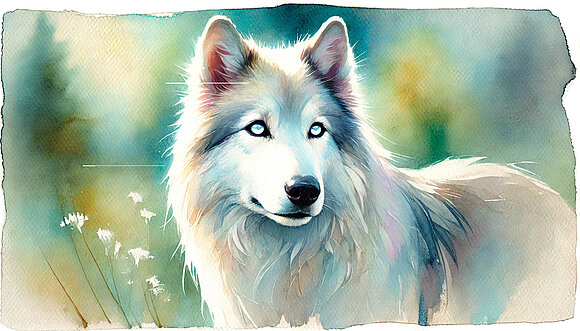A heart sees more than eyes: blind dogs and their amazing lives

Causes of blindness in dogs
There are various reasons why dogs can go blind. Here are some of the most common causes:
Genetic factors
Some dog breeds have a genetic predisposition to eye diseases that can lead to blindness. These breeds include the Collie, Miniature Schnauzer and Labrador Retriever.
Age-related diseases
With increasing age, dogs are more likely to suffer from diseases such as cataracts or glaucoma, which can lead to blindness.
Injuries
Accidents or injuries can also lead to blindness. A serious eye injury can cause irreparable damage and impair or destroy the dog's vision.
Diseases
Certain diseases such as diabetes or high blood pressure can cause eye problems, which in the worst case can lead to blindness.
Dealing with a blind dog
If your dog loses his sight, it is important that you help him to adapt to his new way of life. Here are some tips on how to support your blind dog:
Adapt the environment
Blind dogs are strongly oriented to their surroundings. Make sure your home is safe and easy to navigate. Remove dangerous obstacles and consider using rugs or runners to give your dog extra guidance.
Maintain a routine
Dogs love routine. Stick to your dog's usual routine as much as possible. Feed him at the same time, take the same walks and avoid moving furniture.
Clear communication
Use clear, loud and consistent commands. Blind dogs rely heavily on their sense of hearing, so be patient and understanding when talking to them.
Playful activities
Blind dogs can be just as playful as sighted dogs. Games that engage other senses, such as sniffing games or hiding treats, are great ways to keep your dog busy and stimulated.
Special bond with blind dogs
Many owners of blind dogs report a particularly deep bond with their animals. The intensive care and special communication create a close relationship. Your blind dog will especially appreciate your support and love.
Blind dogs in everyday life
Blind dogs can lead a normal life and do almost everything that sighted dogs can do. They can play, cuddle and even do agility exercises - with a few adaptations of course. Their other senses, especially their sense of smell, compensate for the loss of sight.
Social interactions
Blind dogs can interact well with other dogs and people. It is important that other dogs and people approach calmly and respectfully so as not to frighten the blind dog.
Walks
Walks are still an important part of your blind dog's life. Use a short leash to keep him safe and be aware of obstacles that may cause him difficulty.
Adopting blind dogs
Adopting a blind dog can be an incredibly rewarding experience. Many blind dogs are waiting in shelters for a loving home. With patience and dedication, you can give a blind dog a happy and fulfilling life.
Why adopt blind dogs?
Blind dogs are often less likely to be adopted, even though they are just as loving and loyal companions as sighted dogs. By giving a blind dog a home, you are not only giving it a new life, but also enriching your own in a very special way.
Conclusion
Blind dogs are true heroes who can lead happy and fulfilling lives despite their limitations. With the right support and lots of love, they can be just as happy and active as their sighted counterparts. If you have the opportunity to help a blind dog or even adopt one, you will have an incredibly enriching and rewarding experience. Because a heart often sees more than eyes - especially in our four-legged friends.